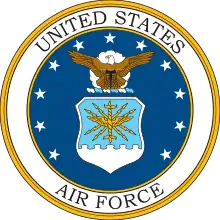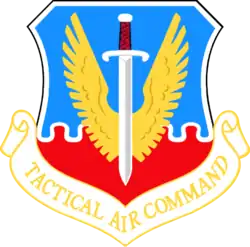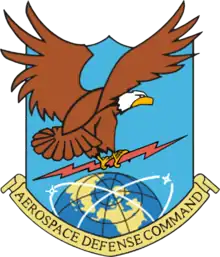414th Combat Training Squadron
The 414th Combat Training Squadron is a United States Air Force unit assigned to the 57th Wing at Nellis Air Force Base, Nevada. The 414th is a non-flying organization charged with hosting Red Flag exercises, Air Combat Command's largest Large Force Exercise (LFE).
| 414th Combat Training Squadron | |
|---|---|
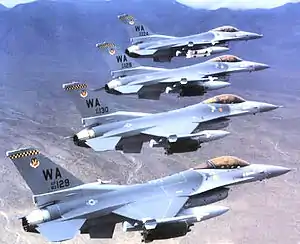 414th Composite Training Squadron – Four aircraft formation | |
| Active | 1943–1947; 1969–1981; 1991–present |
| Country | |
| Branch | |
| Role | Combat Training Unit |
| Part of | Air Combat Command |
| Garrison/HQ | Nellis Air Force Base, Nevada |
| Engagements | |
| Decorations | |
| Insignia | |
| 414th Combat Training Squadron emblem (approved 22 October 1980)[1] | 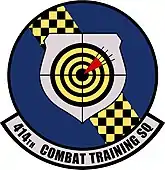 |
| 414th Night Fighter Squadron emblem[2] | 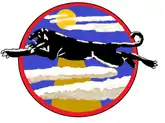 |
The unit was originally formed as the 414th Night Fighter Squadron in 1943. After training, it was deployed to Twelfth Air Force during the North African Campaign to provide air defense interceptor protection against Luftwaffe night air raids. It later operated in Sardinia, Corsica, Italy, plus a detachment served in Belgium during the Battle of the Bulge. It returned to the United States and was inactivated in 1947.
It was reactivated as the 414th Fighter Weapons Squadron at Nellis in 1969, serving in that role until inactivated in 1983. It was activated again at Nellis in 1991 as the 414th composite Training Squadron. In 2005, it became a non-flying squadron managing Red Flag exercises.
Mission
Red Flag is a realistic combat training exercise involving the air forces of the United States and its allies. It is conducted on the bombing and gunnery ranges near Nellis Air Force Base, Nevada. It is one of a series of advanced training programs administered by the Air Warfare Center and Nellis.[3]
The 414th coordinates the General Dynamics F-16 Fighting Falcons flown by the 64th Aggressor Squadron and the ground-based air defenses operated by the 507th Air Defense Aggressor Squadron.[3]
History
World War II
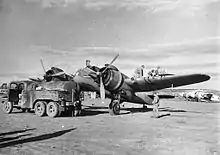
Established as the 414th Night Fighter Squadron in January 1943, trained in Florida with a specialized version of the Douglas A-20 Havoc modified for night combat.[4]
Deployed to Twelfth Air Force in Algeria, May 1943. Equipped with British Bristol Beaufighter, carried out defensive night patrols over Allied-held territory during the North African campaign, also conducted night interdiction raids on German positions in Algeria and Tunisia. After German collapse in North Africa, continued defensive patrols and offensive night attacks on Axis positions on Sardinia, Corsica, and in Italy. Detachment operated with Ninth Air Force in Belgium in late 1944–1945 during the Battle of the Bulge. Re-equipped with P-38Ms (modified Lockheed P-38J Lightnings) for night operations. Fitted with an AN/APS-6 radar in an external radome underneath the nose, relocated radio equipment and anti-flash gun muzzles in early 1945.[4]
The squadron stood down after the end of the European War, May 1945. Designated as not operational, June 1945 – August 1946. Moved on paper to Shaw Field, South Carolina, 15 August 1946 and equipped with returned Northrop P-61 Black Widow night fighters. Squadron was inactivated 16 March 1947, with aircraft being reassigned to the 319th Fighter Squadron (All Weather) and flown to Howard Field, Canal Zone, 1947 for defense of Panama Canal.[4]
Cold War

Redesignated as the 414th Fighter Weapons Squadron on 22 August 1969, the squadron reactivated on 15 October 1969 at Nellis Air Force Base, Nevada, replacing the 4538th Combat Crew Training Squadron. Assigned to the 57th Fighter Weapons Wing, the 414th was tasked with combat crew training, using the McDonnell F-4C Phantom II aircraft.[5] Aircraft initially tail coded "WD", wing tail code "WA" was adopted in October 1971. upgrading to the F-4D and last, the F-4E, tail coded "WA" with black/yellow check tail stripe.[6]
The 414th assumed the duties of the 4440th Tactical Fighter Training Group (Red Flag) on 1 March 1976, performing combat fighter weapons training with the F-4 until the end of 1981, when inactivated and squadron replaced by the F-4 Division of the USAF Fighter Weapons School.[5]
Modern era
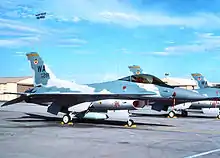
The squadron was redesignated as the 414th Composite Training Squadron and activated, on 1 November 1991, at Nellis. Assigned to the 57th Operations Group, and flying the F-16, the squadron was tasked with conducting Red Flag exercises. In 1993, the unit was renamed the 414th Training Squadron, and in 1994, the 414th Combat Training Squadron. Performed aggressor training with F-16C Fighting Falcons until 2005 when they were reassigned to the 65th Aggressor Squadron, 57th Adversary Tactics Group.[5]
Now a non-flying organization, the 414th, unlike most USAF squadrons which are typically commanded by lieutenant colonels, the present scope of responsibility of the squadron within the United States Air Force Warfare Center (USAFWC) is such that it is now commanded by a full colonel. While the 414th remains technically subordinate to the 57th Operations Group, it is now more analogous to group level-equivalent organization for administration of Red Flag operations.[5]
Lineage
- Constituted as the 414th Night Fighter Squadron on 21 January 1943
- Activated on 26 January 1943
- Inactivated on 1 September 1947
- Redesignated 414th Fighter Weapons Squadron on 22 August 1969
- Activated on 15 October 1969
- Inactivated on 30 December 1983
- Redesignated 414th Composite Training Squadron and activated on 1 November 1991
- Redesignated 414th Training Squadron on 15 January 1993
- Redesignated 414th Combat Training Squadron on 1 July 1994[1]
Assignments
|
|
Stations
|
|
Aircraft
|
|
See also
| Wikimedia Commons has media related to 414th Night Fighter Squadron. |
References
Notes
- Kane, Robert B. (30 June 2009). "Factsheet 414 Combat Training Squadron (ACC)". Air Force Historical Research Agency. Retrieved 6 January 2019.
- Watkins, p. 49
- No byline (6 July 2012). "414th Combat Training Squadron "Red Flag"". 99th Air Base Wing Public Affairs. Archived from the original on 18 September 2015. Retrieved 6 January 2019.
- Pape, Campbell & Campbell,
- No byline (7 May 2011). "414th Combat Training Squadron (414th CTS)". globalsecurity.org. Retrieved 6 January 2019.
- Martin,
- Station number in Johnson.
Bibliography
![]() This article incorporates public domain material from the Air Force Historical Research Agency website http://www.afhra.af.mil/.
This article incorporates public domain material from the Air Force Historical Research Agency website http://www.afhra.af.mil/.
- Johnson, 1st Lt. David C. (1988). U.S. Army Air Forces Continental Airfields (ETO) D-Day to V-E Day (PDF). Maxwell AFB, AL: Research Division, USAF Historical Research Center. Archived from the original (PDF) on 29 September 2015. Retrieved 26 June 2017.
- Martin, Patrick (1994). Tail Code: The Complete History of USAF Tactical Aircraft Tail Code Markings. Atglen, PA: Schiffer Military Aviation History. ISBN 0-88740-513-4.
- Maurer, Maurer, ed. (1982) [1969]. Combat Squadrons of the Air Force, World War II (PDF) (reprint ed.). Washington, DC: Office of Air Force History. ISBN 0-405-12194-6. LCCN 70605402. OCLC 72556. Retrieved 17 December 2016.
- Pape, Garry R.; Campbell, John M.; Campbell, Donna (1991). Northrop P-61 Black Widow: The Complete History and Combat Record. Minneapolis, MN: Motorbooks International. ISBN 978-0-879385-09-5.
- Ravenstein, Charles A. (1984). Air Force Combat Wings, Lineage & Honors Histories 1947–1977. Washington, DC: Office of Air Force History. ISBN 0-912799-12-9. Retrieved 17 December 2016.
- Watkins, Robert A. (2009). Insignia and Aircraft Markings of the U.S. Army Air Force in World War II. Volume IV, European-African-Middle Eastern Theater of Operations. Atglen,PA: Shiffer Publishing, Ltd. ISBN 978-0-7643-3401-6.

